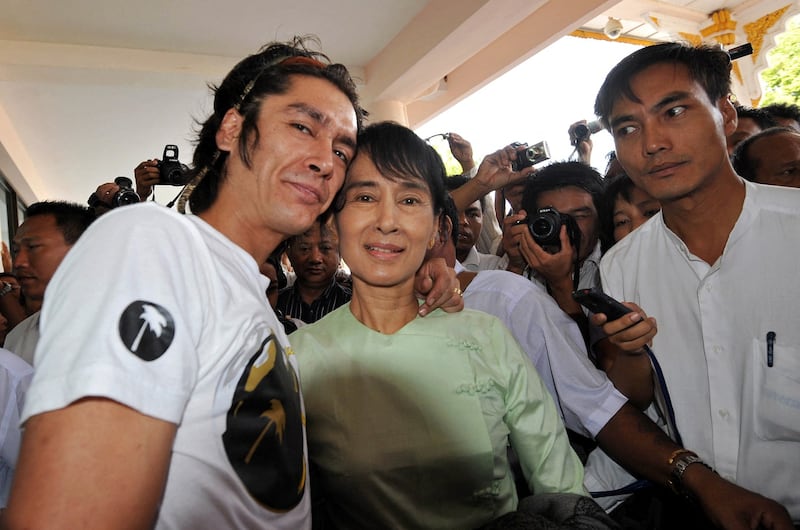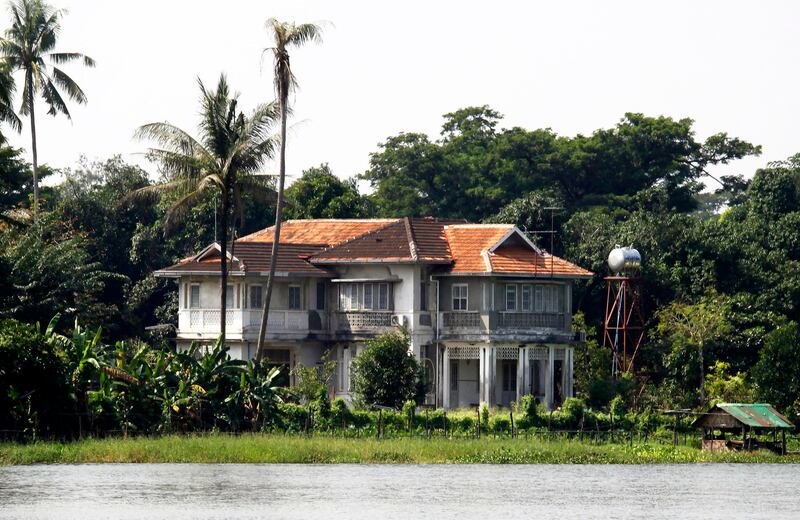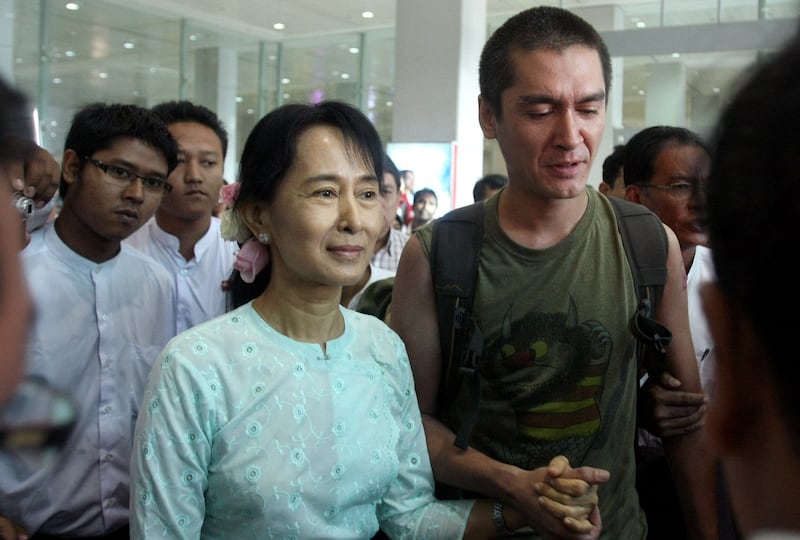In mid-January, Kim Aris received a letter from his mother, Aung San Suu Kyi, the former de facto leader of Myanmar and Nobel laureate who is serving a 27-year prison sentence.
It was the first public communication from her since late 2022, when the junta barred her legal team from visiting her in prison, and the first time he had heard from her since before the Feb. 1, 2021, coup d’etat that removed the democratically elected government from power.
After the coup, the ruling junta sentenced Suu Kyi to 33 years in prison on 19 charges, including corruption. In August, her sentence was reduced to 27 years after she was pardoned for five cases.
Suu Kyi, 78, is suffering from medical and dental problems, including gingivitis, sources have told Radio Free Asia, but the junta has denied her outside medical treatment.
On Jan. 21, Myanmar’s Supreme Court ordered the auction of her family lakeside villa in Yangon, where she spent more than 15 years under house arrest. The starting price is US$90 million. There is a decades-long ownership dispute between Suu Kyi and her estranged older brother, Aung San Oo, who says the house is his.
Last year, Aris, 47, who is based in the United Kingdom, began a new campaign to free her by trying to draw worldwide attention to her incarceration.
In an exclusive interview, RFA Burmese reporter Soe San Aung spoke with Aris. The content has been edited for length and clarity.
RFA: What is your reaction to the junta’s plans to auction off your mother’s house at 54 University Avenue Road in Yangon?
Aris: I was sorry to hear that. This auction is going to go ahead. I know my mother was wanting to use that property for her charities in the future, but at the moment she has no say in what’s happening since she’s locked up, and she’s not even allowed to see her lawyers. So, I know that in the past, she has contested my uncle’s claim on the property, and I know that she would still do so if she had freedom.
RFA: How was Suu Kyi planning to use the property for charities?
Aris: I don't know exactly what she was going to use it for, but she set up the charity in her mother’s name, the Daw Khin Kyi Foundation. I knew it was going to be used for that, but I believe the military has stripped her of all the assets that she has built up for those various charities. So, I don't know what’s going to happen there.

RFA: Can you recall any memories you have of the house?
Aris: I have many memories of that house going back to before my grandmother died. And then, obviously, I was there when my grandmother was dying and for her funeral. When [my mother] was first put under house arrest, I was there as well. And I’ve been back since she was freed from house arrest. So, I have good memories of that house.
Even though some of those memories may not sound that good, they’re good memories for me. For instance, being with her when she was put under house arrest. It may not sound like a particularly good time, and it wasn’t a good time, but it's still a good memory for me.

RFA: Have you heard anything about the care package that you sent to your mother last year?
Aris: I sent a care package last year when we heard that she was not well, and I was given the go-ahead to send a care package. She finally received that at the end of last year, and I received a letter back from her this month. This is the first I have heard from her since before the coup.
RFA: What did the letter say?
Aris: It’s just to do with family and to say that the care package arrived safely. There’s really very little to say. It’s just sending love to the rest of the family and saying that she’s in good spirits. Her spirit is strong, even if her health is not as good as it was in the past.
RFA: Has the junta contacted you about your request to meet with your mother?
Aris: No, they haven’t contacted me at all. I’m still trying to have contact with her regularly, hopefully. But, so far we have only managed to have this one communication.

RFA: Is she in good health?
Aris: I believe she is in reasonable health. I think she has ongoing issues with her teeth and with problems with her neck as well. So, I know she has some of the ongoing health concerns.
RFA: How did you get the letter?
Aris: Through the British Foreign Office.
RFA: When did you receive it?
The date when I got the letter was about two weeks ago, so in mid-January.
RFA: What was written in Aung San Suu Kyi’s handwriting?
Aris: Yes, it was photocopied, and they emailed me the photocopy. I now have the hard copy in my hands as well.
RFA: It’s almost been three years since the military coup d'état and the subsequent fighting between junta and resistance forces and ethnic armies. Where’s this heading?
Aris: Well, I hope that the fighting will stop. It’s been going on for far too long as it is. I know that my mother would be desperately sad to see the situation the country is in at the moment. It’s very hard to say from the outside. It’s very hard to see what’s happening in Burma, really, on the ground. I’m sure even the people inside Burma don’t actually know what’s happening because there are so many different factions involved. So, we can only hope that things will get better sooner rather than later.
RFA: What’s your message for the Burmese people?
Aris: I hope that they can stay strong and keep fighting. Do not give up. I know that it seems like the rest of the world isn’t thinking about what’s happening in Burma, but it’s not true. Just because the media doesn’t show what’s happening doesn’t mean that other people aren’t thinking about what’s happening, and they’re trying to do everything they can to help. So, I hope the fighting will stop soon, and in the meantime, keep on staying strong.
RFA: What’s your message for the junta and your uncle regarding the auction?
Aris: I would say that my uncle has never had any rights to that property since he’s an American citizen, and according to Burmese law, people who are not Burmese citizens can’t hold property or profit from the sale of any property in Burma. The fact that my mother has lived in that house for many years and looked after their mother while she was dying, means that she has more claim to that property than anybody else.
And I hope that she will be able to use it for the purposes that she intended it for — in other words, to benefit all of Burma. I’m sure that if the property gets sold, that money will disappear because the military will take anything that belongs to my mother, and my uncle will take the rest of the money, and it won’t be used for anything within Burma.
Edited by Roseanne Gerin and Malcolm Foster.

